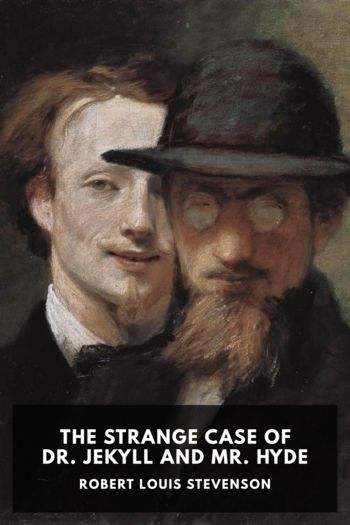Kidnapped - Robert Louis Stevenson (the gingerbread man read aloud TXT) 📗

- Author: Robert Louis Stevenson
Book online «Kidnapped - Robert Louis Stevenson (the gingerbread man read aloud TXT) 📗». Author Robert Louis Stevenson
“She’s bound to be across now,” I whispered.
“Na,” said Alan, “her foot still sounds boss32 upon the bridge.”
And just then—“Who goes?” cried a voice, and we heard the butt of a musket rattle on the stones. I must suppose the sentry had been sleeping, so that had we tried, we might have passed unseen; but he was awake now, and the chance forfeited.
“This’ll never do,” said Alan. “This’ll never, never do for us, David.”
And without another word, he began to crawl away through the fields; and a little after, being well out of eyeshot, got to his feet again, and struck along a road that led to the eastward. I could not conceive what he was doing; and indeed I was so sharply cut by the disappointment, that I was little likely to be pleased with anything. A moment back and I had seen myself knocking at Mr. Rankeillor’s door to claim my inheritance, like a hero in a ballad; and here was I back again, a wandering, hunted blackguard, on the wrong side of Forth.
“Well?” said I.
“Well,” said Alan, “what would ye have? They’re none such fools as I took them for. We have still the Forth to pass, Davie—weary fall the rains that fed and the hillsides that guided it!”
“And why go east?” said I.
“Ou, just upon the chance!” said he. “If we cannae pass the river, we’ll have to see what we can do for the firth.”
“There are fords upon the river, and none upon the firth,” said I.
“To be sure there are fords, and a bridge forbye,” quoth Alan; “and of what service, when they are watched?”
“Well,” said I, “but a river can be swum.”
“By them that have the skill of it,” returned he; “but I have yet to hear that either you or me is much of a hand at that exercise; and for my own part, I swim like a stone.”
“I’m not up to you in talking back, Alan,” I said; “but I can see we’re making bad worse. If it’s hard to pass a river, it stands to reason it must be worse to pass a sea.”
“But there’s such a thing as a boat,” says Alan, “or I’m the more deceived.”
“Ay, and such a thing as money,” says I. “But for us that have neither one nor other, they might just as well not have been invented.”
“Ye think so?” said Alan.
“I do that,” said I.
“David,” says he, “ye’re a man of small invention and less faith. But let me set my wits upon the hone, and if I cannae beg, borrow, nor yet steal a boat, I’ll make one!”
“I think I see ye!” said I. “And what’s more than all that: if ye pass a bridge, it can tell no tales; but if we pass the firth, there’s the boat on the wrong side—somebody must have brought it—the countryside will all be in a bizz—”
“Man!” cried Alan, “if I make a boat, I’ll make a body to take it back again! So deave me with no more of your nonsense, but walk (for that’s what you’ve got to do)—and let Alan think for ye.”
All night, then, we walked through the north side of the Carse under the high line of the Ochil mountains; and by Alloa and Clackmannan and Culross, all of which we avoided: and about ten in the morning, mighty hungry and tired, came to the little clachan of Limekilns. This is a place that sits near in by the waterside, and looks across the Hope to the town of the Queensferry. Smoke went up from both of these, and from other villages and farms upon all hands. The fields were being reaped; two ships lay anchored, and boats were coming and going on the Hope. It was altogether a right pleasant sight to me; and I could not take my fill of gazing at these comfortable, green, cultivated hills and the busy people both of the field and sea.
For all that, there was Mr. Rankeillor’s house on the south shore, where I had no doubt wealth awaited me; and here was I upon the north, clad in poor enough attire of an outlandish fashion, with three silver shillings left to me of all my fortune, a price set upon my head, and an outlawed man for my sole company.
“O, Alan!” said I, “to think of it! Over there, there’s all that heart could want waiting me; and the birds go over, and the boats go over—all that please can go, but just me only! O, man, but it’s a heartbreak!”
In Limekilns we entered a small change-house, which we only knew to be a public by the wand over the door, and bought some bread and cheese from a good-looking lass that was the servant. This we carried with us in a bundle, meaning to sit and eat it in a bush of wood on the seashore, that we saw some third part of a mile in front. As we went, I kept looking across the water and sighing to myself; and though I took no heed of it, Alan had fallen into a muse. At last he stopped in the way.
“Did ye take heed of the lass we bought this of?” says he, tapping on the bread and cheese.
“To be sure,” said I, “and a bonny lass she was.”
“Ye thought that?” cries he. “Man, David, that’s good news.”
“In the name





Comments (0)